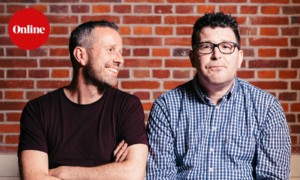On August 23 in Lisbon, at 9:14pm, Kingsley Coman etched his name into soccer’s history book: A looping cross fell onto the featherlight Frenchman’s head, which directed the ball into Paris Saint Germain’s net. The goal would make Bayern Munich Europe’s champion club, and Coman a Bavarian hero.
“In covering serious issues, what I really love about the pod—and something that doesn’t happen very often in sports broadcasting—is that we take the right things seriously.”
The next morning, in a London studio, the Football Weekly podcast crew discussed Coman’s big moment. But there was something else to report: namely, Coman’s 2017 conviction for domestic abuse. German fans shouldn’t be prevented from revelling in their win, the pod argued. But to uncouple the sport from the ills that plague it—racism, homophobia, financial corruption, misogyny—was unthinkable, not least when millions worldwide were marching against racial injustice.
“You have to take a human as their whole,” says Max Rushden, Football Weekly’s host. “It doesn’t mean you don’t talk about [Coman] scoring the winner, but it does mean that you reference it. And I’ve been surprised at how few people mentioned [the conviction], because it’s a difficult thing to talk about, and it’s not your classic subject matter: you’re talking about the Champions League Final. You’re looking for heroes or villains on the pitch. You’re not looking for anything beyond that.”
That Football Weekly should pivot toward more politically-oriented content should be of little surprise. It is, after all, the flagship sports podcast of The Guardian, Britain’s leading left-leaning newspaper.
Perhaps more surprising is how Rushden, co-host Barry Glendenning (the Guardian’s online deputy sports editor) and a revolving door of high-profile writers have kept hold of their number-one spot (the show has a rumored 150,000 downloads per episode) despite venturing into topics fans often avoid.

That, Rushden argues, is often down to a combination of two things. One is a confident, comedic style that comes naturally to an experienced live television and radio presenter. The other is a staunch refusal to take the soccer itself too seriously.
“In covering serious issues, what I really love about the pod—and something that doesn’t happen very often in sports broadcasting—is that we take the right things seriously,” says Rushden. As we spoke for this article, a Saudi state-backed investment vehicle was pondering a bid for Premier League club Newcastle United (the deal subsequently failed, owing more to alleged Saudi pirating of league TV feeds than human-rights concerns).
“We’re taking that seriously, whereas we don’t really take seriously whether Arsenal lost on Friday,” says Rushden. “Obviously it matters, but it matters in a different way. I guess you’re trying to ask yourself ‘What is the point of football, and why do we all love it?’ And if we love it so much, we do have to talk about the things that aren’t great in football.”
Football—sorry, soccer—is the world’s most popular sport. Almost half the world’s population watches it, and a quarter of a billion people play it regularly. Soccer podcasts might be the most congested subject: a quick glance at Player.fm reveals over 100 well-produced shows and there are hundreds upon hundreds more.
Football Weekly began life in 2006 as the World Cup Show, produced daily during the FIFA World Cup in Germany. Its popularity soared, soon spawning the title it has retained ever since. Glendenning appeared on that first pod 14 years back, alongside host James Richardson.
When Richardson left in 2017 to form a rival pod, The Totally Football Show, with Football Weekly producer Ben Green, the Guardian bosses signed Rushden. A familiar name for British soccer fans, he’d spent years hosting Saturday morning magazine show Soccer AM, with radio gigs for the BBC and, latterly, TalkSport, the world’s biggest sports radio station.
Rushden’s tenure as host brought instant success. In 2018, Football Weekly won a second straight podcast-of-the-year award by the prestigious Football Supporters’ Federation, cementing its spot as the UK’s most popular title. (Last year’s award was won by That Peter Crouch Podcast, hosted by the eponymous ex-England striker).
It sits atop a pile of British soccer pods, including straighter ones like The Football Ramble and Stadio and comedies such as 90s-nostalgic Quickly Kevin and the darkly brilliant Athletico Mince (which is only a little bit about soccer, in truth).
Each of those shows has an angle just off-center. Football Weekly aims to be a “broad football church,” according to Glendenning, and its format—rambles through English, British, and European soccer leagues—focuses less on quirks than it does solid expertry and lighthearted comment—and a willingness to cover the game’s less salubrious side when most shows aim to stay in their lane.
Surviving soccer-less lockdown posed challenges for sports titles this year. Football Weekly used the medium’s intimacy to bring listeners closer to presenters. Journalists spoke about their career paths, and the team analyzed matches from bygone eras as if they’d happened yesterday.
“Podcasts are such intimate things compared to any other medium—with radio second and TV a distant third in terms of the relationship that listeners have—because you’ve actively chosen to download this,” Rushden says. “Finding out how [experts] ended up sitting on the podcast, I think our listeners found that really interesting. I hope we continue to do stuff like that, but it’s very hard when football starts because there’s just so much.”
On the face of it, Rushden says, there’s little difference between live radio and podcasting. “Ultimately, you’re trying to get a subject across and entertain,” he says. “Your bottom line is the same. Broadly, they’re sitting in an airless room, talking out loud, trying to have fun.”
There are, however, “subtle differences.” Live radio is warts-and-all entertainment. Stutters, awkward silences, mispronounced names: they all stay in—and even help create a quickfire, chaotic enjoyment. Podcasts are pre-recorded (Football Weekly is unscripted nonetheless). “My instinct is to want to record the podcast in one take,” Rushden says. Editing is fine, of course,, “as long as you’ve got the flow.
“I feel the flow of it really matters,” he adds. “If you get off to a great start, and you feel it go and think, ‘This is great, and everyone in the room or on Zoom is enjoying it,’ I feel that comes across. So I feel very reticent to stop anything and start again. I don’t mind listeners hearing mistakes.”
Listeners certainly don’t seem to mind either: Football Weekly recently went from two to three shows weekly. Rushden would like to use The Guardian’s journalistic pedigree to create more investigative episodes in the future. Perhaps an edition could dig into racism in stadiums, or the massive rise in organized crime in the sport.
“But we still want to muck about and have fun,” Rushden adds. That’s the core of the pod’s rampant success. It knows when to be serious, and when soccer is just a game. It’s fun too. And with players back on the field (who knows for how long), the host will simply continue enjoying work and building one of the world’s best-loved sports podcasts. “Where I’m lucky is that I took over the biggest one,” he says. “And I haven’t completely fucked it up yet.”




Comments